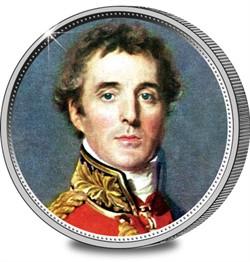
 |
Full name: Arthur Wellesley
Born: 1st May 1769
Place of Birth: Dublin, Ireland
Occupation: First Duke of Wellington
Died: 14th September 1852
|
As one of the most notable figures of the 19th Century, Arthur
Wellesley was born in Dublin, Ireland on 1st May 1769 and was the
fourth son of the Earl and Countess of Mornington. Wellesley
was a student at Eton but was unsuccessful and given private
classes in Brussels before attending a French Military Academy at
Angers in Anjou. In 1787, Wellesley joined the army as a
lieutenant of the highland infantry regiment and five years later
he became captain of the dragoons.
Wellesley fought against the French in Flanders in 1794 and
shortly after, in 1796, he moved to India as a colonel and took
part in the Mysore war. Wellesley was promoted to
major-general in 1802 during the Maratha War and won the Battle of
Assaye, he was knighted for his efforts on his return to the UK in
1805.
Wellesley was appointed a Member of Parliament for Rye and soon
after, he became Chief Secretary for Ireland. Meanwhile, Wellesley
continued military duties and took charge of the British,
Portugease and Spanish army in 1808 during the Peninsular
War.
Wellesley was appointed the First Duke of Wellington in 1814 and
he claimed victory over the French and Napoleon in the Napoleonic
Wars. The Duke also became commander of the allied armies and
defeated Napoleon at the Battle of Waterloo in 1815. On his return
to Britain, Wellesley was formally honoured and given an estate in
Hampshire.
The Duke was appointed Commander in Chief of the British Army
and became Prime Minister in 1828 the following year. The
Duke was conservative and achieved Catholic emancipation but became
unpopular due to his reluctance over parliamentary reforms and was
often referred to as the 'Iron Duke'.
Wellesley was replaced by Earl Grey in 1830 after his party lost
the election, but on gaining power again in 1834, Wellesley refused
the offer of Prime Minister. Robert Peel replaced the Duke of
Wellington, who became Foreign Minister before becoming Leader of
the House of Lords, but retired from politics in 1846. After
his time as Prime Minister, the Duke became foreign minister until
his retirement in 1846.
Arthur Wellesley died on 14th September 1852 and was buried at
St. Paul's Cathedral. An arch was erected in Hyde Park to
commemorate the Duke of Wellington and it still stands today.